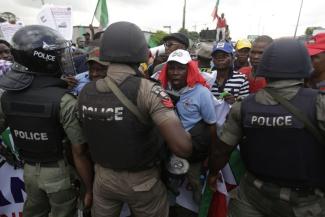Comment
Hard time to be president

According to official data, Nigeria’s economy went into recession in this year’s second quarter, contracting by 0.36 %. The downturn has several reasons. The most important one is the low oil price on world markets. Problems are compounded, however, by violent unrest having reduced oil production in the Delta region by about one third. Inflation has been rising. Consumer prices are rising fast and so is unemployment. Many people struggle to make ends meet.
The Boko Haram insurgency in Nigeria’s north-east is primarily an issue of security and politics, but it obviously has a bearing on the economy too. For one thing, it requires military attention and, implicitly, government funds.
For a long time, the Buhari administration seemed to be in a state of denial about the state of the economy. The president apparently hoped that it would be possible to lead the country out of the slump by clamping down on corruption on the one hand and letting the government play a commanding role in the economy on the other.
Buhari headed Nigeria’s military government in the mid-1980s and declares himself to be a “converted democrat” now. Until recently, however, he had not backtracked from a 1980s approach to economic policies. Back then, leaders of former colonies basically believed that they could develop and diversify the economy by ordering companies what to do. A fixed exchange-rate, in this context, was a matter of pride.
Buhari won the presidential elections in 2015 because his campaign promises attracted many voters. He pledged to fight the all too common abuse of public office for private gains. Moreover, he said he would reclaim funds that had been lost to corruption.
Nigerians are fed up with living in poverty while a small elite siphons off the country’s oil wealth. A little more than 60 % of the people were living in poverty at the beginning of this year, and that ratio has surely increased in the current economic crisis.
It adds to the problems that Nigeria’s government must bring order to public finances. Last year, the president ordered the central bank to bail out 27 Nigerian states so they could pay outstanding salaries. The budgets of 36 states and almost 800 local governments have a tendency of sinking ever deeper into the red.
Buhari is an unlucky president in one important respect: he assumed office when the economy started to deteriorate. It was not his fault that the oil price slumped, but it radically restricts his policy options. Last year, Vice President Yemi Osinbajo said that the new government was inheriting the economy in its worst moment in history. Previous governments could rely on huge oil revenues, but the Buhari administration must cope in leaner times.
In a dramatic change of policy, Nigeria’s central bank unpegged the naira, the national currency, from the dollar in June. Earlier, one dollar had officially cost 199 naira. Today, it costs 280 naira.
The new currency regime has important upsides:
- First of all, it means that Nigeria’s foreign-exchange reserves are not depleted as fast as they were when the government guaranteed an excessive exchange rate. Indeed, it was beginning to run short of dollars.
- The black market in which currencies were traded has lost its relevance.
- Nigerian exports become cheaper, and that trend should stimulate the economy.
However, the new currency regime also has downsides. The most important is that imports are now more expensive, and consumer prices have risen even faster as a result. Moreover, Nigeria really has only one major export good: oil. It is traded globally, and the national exchange rate has little bearing on the world market. Therefore, the devaluation of the naira will probably not have a huge impact on exports.
Buhari has great policy aspirations. People believe he is serious about wanting to end corruption and quenching both the Boko Haram insurgency and the Delta crisis. If he cannot get a grip on the economy however, he will struggle to achieve anything at all.
Ibrahim Mohammed is a Nigerian journalist.
ibrahim.mohd80@yahoo.com







